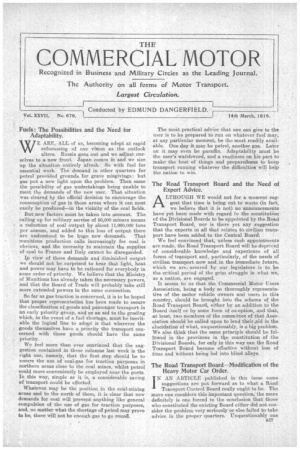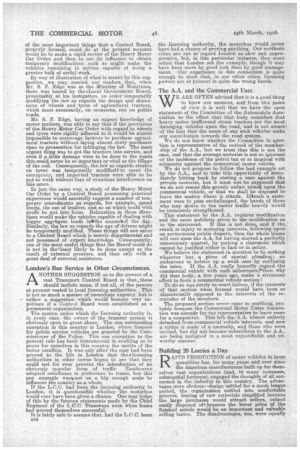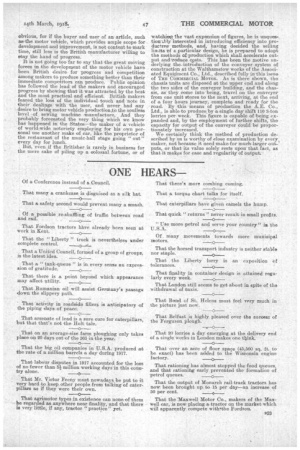Fuels: The Possibilities and the Need for Adaptability.
Page 1

Page 2

Page 3

If you've noticed an error in this article please click here to report it so we can fix it.
WE ARE, ALL or us, becoming adept at rapid refocussing of our vision as the outlook alters. Russia goes out and we adjust ourselves to a new front. Japan comes in and we size up the situation entirely afresh. So with fuel for eSsential work The demand in other quarters for petrol provided grounds for grave misgivings : but gas put a new light upon the problem. Then came the possibility of gas undertakings being unable to meet the demands of the new user. That situation was cleared by the official decision to encourage the consumption of gas in those areas where it can most easily be produced—in the vicinity of the coal fields.
But new factors must be taken into account. The calling up for military service of 50,000 miners means a reduction of coal output by about 11,000,000 tons per annum, and added to this loss of output there are understood to be huge new demands. That munitions production calls increasingly for coal is obvious, and the necessity to maintain the supplies of coal to France and Italy cannot be disregarded.
I.,n view of these demands and diminished output we should not be surprised to hear that light, heat and power may have to be rationed for everybody in some order of priority, We believe that the Ministry. of Munitions has already taken the necessary powers, and that the Board of Trade will probably take still more extended powers in the same connection.
So far as gas traction is concerned, it is to be hoped that proper representation has been made to secure the classification of goods and passenger transport in an early priority group, and as an aid to the grading which, in the event of a fuel shortage, must be inevitable the logical line to adopt is that wherever the goods themselves have a priority the transport concerned with those goods should have the same priority.
We feel more than ever convinced that the suggestion contained in these columns last week is the right one, namely, that tho first step should be to secure the use of coal-gas for traction purposes in northern areas close to the coal mines, whilst petrol could more conveniently be employed near the ports. In this way; simple as it is, .a considerable saving of transport could be effected.
Whatever, may be the position in the coal-mining areas and to the north of them, it is clear that new demands for coal will prevent anything like general compulsion of the use of gas for traction purposes, and, no matter what the shortage of petrol may prove to be, there will not be enough gas to go round. The most practical advice that one can give to the user is to be prepared to run on whatever fuel may, at any particular moment, be the most readily available. One day it may be petrol, another gas. Later on it may even be paraffin. Adaptability must be the user's watchword, and a readiness on his part to make the best of things and preparedness to keep transport running whatever the difficulties will help the nation to win.
The Road Transport Board and the Need of Expert Advice.
ALTHOUGH WE would not for a moment suggest that time is being cut to waste (in fact, we believe that it is not) no announcements have yet been made with regard to the constitution of the Divisional Boards to be appointed by the Road Transport Board, nor is there yet any suggestion that the experts in all that relates to Civilian transport have been added to the Central Board. . :
We feel convinced that, unless such appointments are made, the Road Transport Board will be deprived of considerable knowledge and experience of all forms of transport and, particularly, of the needs of civilian transport now and..in the immediate future, which we are, assured by our legislators is to be the critical period of the grim struggle in what we, as a nation, are engaged.
It seems to us that the Commercial Motor Users Association, being a body so thoroughly representative of the motor vehicle owners and users in this country, should be brought into the scheme of the Road Transport Board, either by an addition to the Board itself or by some form of co-option, and that, at least, two members of the committee of that Association should be called upon to lend their.aid in the elucidation of what, unquestionably, is a big problem. We also think that the same principle should be follawed in the provinces in the constitution of the Divisional Boards, for only in this way can the Road Transport Board become effective without loss of time and without being led into blind alleys.
The Road Transport Board—Modification of the Heavy Motor Car Order.
IN AN ARTICLE published in this issue some suggestions are put forward as to what a Road Transport Control Board really ought to be. The more one considers this important question, the more definitely is one forced to the conclusion that those who constituted the existing Board either did not con
sider the problem very seriously or else failed to take advice in the proper quarters. Unquestionably one of the most important things that a Control Board, properly formed, could do at the present moment would be to make a rapid review of the Heavy Motor Car Order and then to use its influence to obtain temporary modifications , such as might make the vehicles remaining in service capable of doing a greater bulk of useful work. . By way of illustration of what is meant by this suggestion, we may remind our readers, that, when Mr. S. F. Edge was at the Ministry Of Munitions, there was issued by thesLocal Government Board, presumably at his instigation, an order temporarily modifying the law as regards the design and dimensions of wheels and tyres of agricultural tractors, which must neceasarily, on occasions, run on public roads.
Mr. S. F. Edge, having an expert knowledge of motor matters, was able to say that if the provisions of the Heavy Motor Car Order with regard to wheels and tyres were rigidly adhered to it would be almost impossible to encourage farmers to purchase agricultural tractors without laying almost every purchaser open to prosecution for infringing the law. The most urgent thing was to get the tractors into service, and even if a little damage were to be done to the roads this could never be so important or vital as the tillage of the soil. Consequently, the law as regards strakes on tyres was temporarily modified t to meet the emergency, and imported tractors were able to be put to work without fear of vexatious interference on this score.
In just the same way, a study of the Heavy Motor Car Order by a Control Board possessing practical experience would assuredly suggest a number of temporary amendments as regards, for example speed limits, the use of trailers, and so on which could with profit be put into force. Relaxation in these directions would make the vehicles capable of dealing with bigger aggregate loads inethe coursetof the day. Similarly, the law as regards the age of drivers might be temporarily modified. These things will not occur to a Control Board which is merely departmental and not possessed of expert knowledge. Consequently, one of the most useful things that the Board'could do is not in thesleast likely to be done except as the result of external pressure, and then only with a great deal of external assistance.
London's Bus Service in Other Circumstances.
ANOTHER SUGGESTION as to the powers of a, real Transport Control Board is thatethese should include some, if not all, of the powers
at present vested in local licensing authorities. This is not so much a matter of immediate urgency, but is rather a suggestion which would become very important if a Control Board were established as a permanent organization. The system under which the licensing authority is, in every case, the owner of the tramcar system is obviously open to great abuse. The one outstanding exception in this country is London, where licences for public service vehicles are granted by the Com missioner of the Police. This one exception to the general ride has been instrumental in enabling us to prove for ourselves in this country the merits of the motor omnibus. It was only after the case had been proved to the hilt in London that thea licensing authorities in other towns began to see that they could not for ever prevent the introduction of an obviously ipopular form of traffic. Eastbourne adopted omnibuses in preference to trams, but this one example wasanot on a big enough scale to influence the country as.a whole. If the L.C.C. had been the licensing authority in London, it is, questionable whether the motorbus would ever have been given a chance. One may judge of this by the fatuous statements made by the Chief Engineer of the L.C.C. Tramways even when buses had proved themselves successful. It is fairly safe to assume that, had the L.C.C. been B18 the -.licensing authority, the motorbus would never have had a chance of 'arming anything. Our northern cities are apt to regard London as slow and unprogressive, but, in this particular instance, they must admit that Lendon set the example, though it may have been more by good luck than by good management. Our experience in this connection is quite enough to show that, in our other cities, licensing powers are at present in quite the wrong hands.
The A.A. and the Commercial User.
WE ARE OFTEN advised that it is a good thing to know our enemies, and: from this point of view it is well that we have the open. statement of the Committee of the Automobile Association to the effect that that body considers that heavy motor tra.fficsand steam tractors are the most damaging vehicles upon the road, and is not aware of the foot that the users of any such vehicles make any contribution towards the road system. We do not know whether the Committee in question is representative of the outlook of the membership of the A.A., but we trust that this is not the case, and that the average motorist is not so ignorant of the incidence of the petrol tax or so inspired with animosity against the commercial motor vehicle.
We do not propose to follow the bad example set by the A.A., and to take this opportunity of iramediately hitting back by stating a case against the private motorist, but it must -not be supposed that we do not resent this grossly unfair attack upon the commercial vehicle, or that we shall be disposed to leave the matter where it stands. Illsuch a statement were to pass unchallenged, the hands of those who may desire to tax motor traffic heavily would be immensely strengthened. This statement by the A.A. requires modification and the same publicity given to the modification as to the statement. If this is not done, and if the. result is injury to motoring interests, following upon an acrimonious public dispute, then the whole blame will rest upon the A.A. for having started a, perfectly unnecessary quarrel, by making a statement which cannot be justified either in fact or in policy.
We believe the statement in question to be nothing whatever but a piece of special pleading; an endeavour to bolster up a, weak case by confusing the issue. If the A.A. really honestly regard the commercial vehicle with such abhorreneerthen why did that body, a few years ago, make a, strenuous effort to form a commercial vehicle section?
To do so was surely to court failure, if the interests of that section when formed would have been so diametrically .opposed to the interests of the remainder of the members.
The proposed section never came to anything, probably because the Commercial Motor Users Association was already far too representative to leave room for a competitor. Thisleft the A.A. almost entirely detached frara,commerciaI vehicle interests, and now a virtue is made of a necessity, and those who were invited, 'but did not become' subscribers to the A.A., are being maligned in a most unjustifiable and unworthy manner.
Building 20 Lorries a Day.
AHD PRODUCTION of motor vehicles in large, quantities has, for many years and ever since the American manufacturers built up for themselves vast organizations (and, in many instances, substantial fortunes), engaged the thoughts of all concerned in the industry in this country. The advantages were obvious—design settled for a much longer period, the organization settled into comfortable grooves, buying of raw materials simplified because the large purchases would attract sellers, output easily disposed of s because the lower price of the finished article would be an important and valuable selling factor. The disadvantages, too, were equally obvious, for if the buyer and user of an article, such asethe motor vehicle, which provides ample scope for development and improvement, is not content to mark time, still less'is the British manufacturer willing to stay the hand of progress.
It is not going too far to say that the great moving forces in the development of the motor vehicle have been British desire for progress and cOmpetition among makers to produce something better than their • immediate competitors can produce. Public opinion • has followed the lead of the makers and encouraged progress by showing that it was attracted by the best and the most practical and efficient. British makers feared the loss of the individual touch and note in their dealings with the user, and never had any • desire to bring motor vehicle productionto the soulless level of sewing machine manufacture. And they probably forecasted the -very thing -which we know • has happened in the States—the maker of a vehicle of world-wide notoriety employing for his own personal use another make of car, like the proprietor of the restaurant of the music-hall stage going " out" every day for lunch.
But, even if the Britisher is rarely in business for the mere sake of piling up a colossal fortune, or of watching the vast expansion of figures, he is unquestionably interested in introducing efficiency into productive methods, and, having decided the selling limits of a particular design, he is prepared to adopt the methods of production which shall accelerate output ancUreduce cpsts. This has been the motive underlying the-introduction of the conveyer system of construction at the Walthamstow works of the Associated Equipment Co., Ltd., described fully in this issue of THE COMMERCIAL MOTOR. As is there shown, the chassis units are disposed at the upper end and along the two sides of the conveyer building, and the chassis as they come into being, travel on the conveyer from one unit stores to the next, arriving, at the end of a four hours journey, complete and ready for the road. By this means of production the A.E. Co., Ltd., is able to produce,by a single day shift 110 3-ton lorries pees week. This figure is capable of being expanded and, by the employment of further shifts, the capacity for output of the conveyer could be proportionately increased. We certainly think the method of production described by us is worthy of elose examination by every, maker, not because it need make for much-larger outputs, or that its value solely rests upon that fact, as that it makes for ease and regularity of output.






















